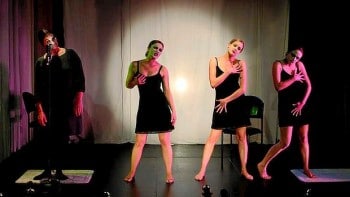La Mama: The Penelopaid
Margaret Atwood’s The Penelopiad is a confronting and humorous account of Penelope, a bit player in the epic Odyssey. Famous for her patience and faithfulness, Penelope waits 20 years for her husband Odysseus while he and his Greek compatriots battle the Trojans to regain beautiful Helen – the rightful property of the Greeks. For the last 10 years of Odysseus’s absence, no one knows whether he’s alive or dead, but Penelope remains hopeful and faithful.

Atwood takes what little we know of Penelope and forms a real woman – a believable, interesting, compelling woman, who Carolyn Bock brings to life with grace, skill and power. We meet Penelope at 15 when she is married to Odysseus and falls into adoring love. We watch her grow up, becoming jaded by life, yet determined to prove her worth and protect her kingdom. Our image of clever Odysseus becomes tarnished when seen through her eyes, as she finally learns the full story of his philandering adventures.
The character and performance of Penelope is the highlight of this show, however that’s only half of it. The plot is also based on the story of the 12 maids, slave girls who are Penelope’s closest friends and helpers, who sacrificed their bodies to keep Penelope’s suitors occupied, while Penelope delayed remarriage.
The 12 maids are played by three women, so the stage holds four only. Penelope narrates while her abridged chorus of maids enact other characters, as well as scenes of their sexuality and rape. This is a cabaret chorus – sexy, crass and confronting.
The cabaret styling with its sexualised choreography and focus on the maid’s bodies jarred at me throughout the show, as we heard the maid’s stories of their lives as slave girls – being free labour then easy sex. And with such a bare set, the bareness of the female bodies was all the more striking.
At the time, all I felt was acute discomfort. On further reflection, I read a powerful and painfully relevant message.
In the show, Penelope was my escape and protection from the brutalising story of the maids. She was fully clothed, safe to look at, not really part of the cabaret. I sympathised with her plight: she had to use her maids to protect herself, trying to hold her kingdom together while she waited for her husband. Then when her maids meet their sorry end at the hands of Odysseus, I still sympathised more with Penelope than them. Strange! But why? Because the maids are dehumanised by being sexualised. To me, this was a striking realisation. The maids suffer the most, yet Penelope gets my pity, for her guilt, her pain, her anger. I sympathise with the fact that no matter how good a woman tries to be, she will suffer.
Yet, the ‘bad’ women will also suffer, once they have fallen or been forced into a sexualised role. So, can a woman win?
I cannot help but see our culture reflected here – a culture that treats women as sex objects then condemns them for it. A culture that demands faithfulness from a wife – at any cost. This production is powerful, confronting and an important voice in the public debate about how we culturally view and treat women. I sincerely wish everyone could experience it.

